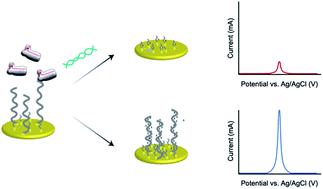当前位置:
X-MOL 学术
›
Chem. Sci.
›
论文详情
Our official English website, www.x-mol.net, welcomes your
feedback! (Note: you will need to create a separate account there.)
An amplification-free ultra-sensitive electrochemical CRISPR/Cas biosensor for drug-resistant bacteria detection
Chemical Science ( IF 7.6 ) Pub Date : 2021-09-03 , DOI: 10.1039/d1sc02197d Akkapol Suea-Ngam 1 , Philip D Howes 1, 2 , Andrew J deMello 1
Chemical Science ( IF 7.6 ) Pub Date : 2021-09-03 , DOI: 10.1039/d1sc02197d Akkapol Suea-Ngam 1 , Philip D Howes 1, 2 , Andrew J deMello 1
Affiliation

|
Continued development of high-performance and cost-effective in vitro diagnostic tools is vital for improving infectious disease treatment and transmission control. For nucleic acid diagnostics, moving beyond enzyme-mediated amplification assays will be critical in reducing the time and complexity of diagnostic technologies. Further, an emerging area of threat, in which in vitro diagnostics will play an increasingly important role, is antimicrobial resistance (AMR) in bacterial infections. Herein, we present an amplification-free electrochemical CRISPR/Cas biosensor utilizing silver metallization (termed E-Si-CRISPR) to detect methicillin-resistant Staphylococcus aureus (MRSA). Using a custom-designed guide RNA (gRNA) targeting the mecA gene of MRSA, the Cas12a enzyme allows highly sensitive and specific detection when employed with silver metallization and square wave voltammetry (SWV). Our biosensor exhibits excellent analytical performance, with detection and quantitation limits of 3.5 and 10 fM, respectively, and linearity over five orders of magnitude (from 10 fM to 0.1 nM). Importantly, we observe no degradation in performance when moving from buffer to human serum samples, and achieve excellent selectivity for MRSA in human serum in the presence of other common bacteria. The E-Si-CRISPR method shows significant promise as an ultrasensitive field-deployable device for nucleic acid-based diagnostics, without requiring nucleic acid amplification. Finally, adjustment to a different disease target can be achieved by simple modification of the gRNA protospacer.
中文翻译:

用于耐药细菌检测的无放大超灵敏电化学 CRISPR/Cas 生物传感器
持续开发高性能且具有成本效益的体外诊断工具对于改善传染病治疗和传播控制至关重要。对于核酸诊断,超越酶介导的扩增分析对于减少诊断技术的时间和复杂性至关重要。此外,一个新兴的威胁领域是细菌感染的抗菌素耐药性 (AMR) ,其中体外诊断将发挥越来越重要的作用。在此,我们提出了一种利用银金属化(称为 E-Si-CRISPR)检测耐甲氧西林金黄色葡萄球菌(MRSA)的无放大电化学 CRISPR/Cas 生物传感器。使用针对mecA的定制设计的引导 RNA (gRNA)作为 MRSA 的基因,Cas12a 酶在与银金属化和方波伏安法 (SWV) 一起使用时可以实现高度灵敏和特异性的检测。我们的生物传感器具有出色的分析性能,检测限和定量限分别为 3.5 和 10 fM,线性度超过五个数量级(从 10 fM 到 0.1 nM)。重要的是,当从缓冲液转移到人血清样品时,我们没有观察到性能下降,并且在存在其他常见细菌的情况下对人血清中的 MRSA 实现了出色的选择性。E-Si-CRISPR 方法作为一种用于基于核酸的诊断的超灵敏现场可部署设备显示出巨大的前景,无需核酸扩增。最后,通过简单修改 gRNA protospacer 可以实现对不同疾病目标的调整。
更新日期:2021-09-03
中文翻译:

用于耐药细菌检测的无放大超灵敏电化学 CRISPR/Cas 生物传感器
持续开发高性能且具有成本效益的体外诊断工具对于改善传染病治疗和传播控制至关重要。对于核酸诊断,超越酶介导的扩增分析对于减少诊断技术的时间和复杂性至关重要。此外,一个新兴的威胁领域是细菌感染的抗菌素耐药性 (AMR) ,其中体外诊断将发挥越来越重要的作用。在此,我们提出了一种利用银金属化(称为 E-Si-CRISPR)检测耐甲氧西林金黄色葡萄球菌(MRSA)的无放大电化学 CRISPR/Cas 生物传感器。使用针对mecA的定制设计的引导 RNA (gRNA)作为 MRSA 的基因,Cas12a 酶在与银金属化和方波伏安法 (SWV) 一起使用时可以实现高度灵敏和特异性的检测。我们的生物传感器具有出色的分析性能,检测限和定量限分别为 3.5 和 10 fM,线性度超过五个数量级(从 10 fM 到 0.1 nM)。重要的是,当从缓冲液转移到人血清样品时,我们没有观察到性能下降,并且在存在其他常见细菌的情况下对人血清中的 MRSA 实现了出色的选择性。E-Si-CRISPR 方法作为一种用于基于核酸的诊断的超灵敏现场可部署设备显示出巨大的前景,无需核酸扩增。最后,通过简单修改 gRNA protospacer 可以实现对不同疾病目标的调整。











































 京公网安备 11010802027423号
京公网安备 11010802027423号